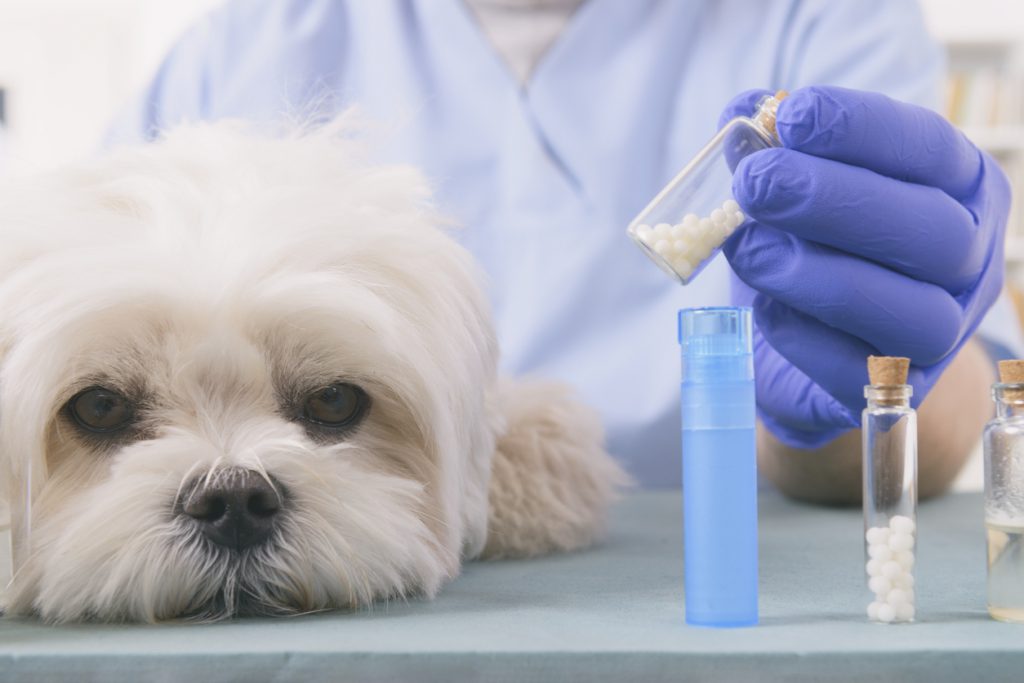In the course of practice, it is not uncommon for homeopaths to receive inquiries in relation to homeopathy treatments for pets, since clients’ desire to seek a natural, gentle and non-invasive treatment for their pets stems from their own positive experience of homeopathic care. It is not very well known that homeopathy is in fact one of the few available natural treatment choices that can be equally beneficial for dogs and other pets, as it is for their owners.
There has in recent times been a surge in demand for natural health care options that are safe and free from side effects. Complementary and alternative medicine in the form of herbal medicine, acupuncture, traditional Chinese medicine and counselling all provide sufficient natural treatment choices for humans but unfortunately for our four-legged friends these natural forms of treatments are either not readily available or are unsuitable.
Dogs are arguably the most popular pet in the UK and are ranked number one in household ownership of pets. So it is no surprise that our furry friends make an occasional appearance for a homeopathic consultation. Their owners, sometimes prompted by their family or friends, reluctantly book a consultation with a homeopath, uncertain as to the treatment’s efficacy. But more often than not they are left pleasantly surprised to see the effect of homeopathic remedies on the health and well-being of their dogs.
Homeopathy - a Preferred Choice of Alternative Treatment for Dogs

Homeopathic remedies may take some time, usually 4-6 weeks in showing their beneficial effects on human beings. But with dogs it is a little different - sometimes only 2-3 days are enough to display a marked improvement in symptoms. There is a reason that dogs respond so well to homeopathic treatment. Animals are usually free from lifestyle-related contaminations that humans are predisposed to, such as smoking, drinking, consuming fruit and vegetables sprayed with insecticides, eating processed food and using cosmetics loaded with harmful chemicals. All these things can contaminate our bodies, which can in turn impede the action of homeopathic remedies.
Homeopathic remedies are highly diluted and therefore subtle in action, making them equally safe for dogs and puppies. They work by way of stimulating the healing capacity of the body, and in the process restore health and wellbeing. And if the pathways they follow are clear and unblocked- as is usually the case with dogs - the results can be achieved quickly.
Considerations for Treatment of Chronic Conditions
In cases of chronic conditions, the success of homeopathic treatment is dependent on finding a suitable remedy in relation to the symptoms being manifested by a patient. It is of utmost importance for homeopaths to take note of minute details that make an individual unique, including behaviours, habits and constitution. By way of example, there are more than seventy remedies for the common condition of asthma, and a homeopath having taken note of the individual’s triggers, time of aggravation, factors that provide relief and other such relevant details, will carefully collate all the symptoms before deciding on the remedy. The correct treatment will be the one which most closely deals with the individual’s unique set of symptoms, personality and disposition. And so it remains the case that any successful homeopathic treatment is highly dependent on the close diligence and information-gathering by the homeopath.
In a similar way, dogs with longstanding chronic conditions will need to be investigated thoroughly to select a remedy unique to their set of symptoms, behaviour and emotions. The disposition of a dog such as whether he/she is playful or shy, anxious or calm, angry or joyful and so on, will have a bearing in deciding the homeopathic treatment protocol. To further elaborate this point - a dog suffering from asthma that worsens during damp weather might need the homeopathic remedy called Natrum Sulph in preference of Ipecac which is usually the first port of call when dealing with asthma. Similarly, a low-spirited, easily vexed and frightened dog might need the homeopathic remedy called Phosphorus for chronic diarrhea in preference to other more typical remedies. A dog’s disposition remains vital in deciding on the correct treatment.
Homeopathy is equally useful to deal with sudden, short-term conditions in dogs such as fever, abscesses and fatigue. In this case, pet owners can make use of homeopathic remedies without the need to consult a homeopath, because in such cases only pathological symptoms being displayed by a dog are enough to decide on the remedy. It is not uncommon to hear of success stories from clients whereby their pets have recovered from minor short-term ailments quickly after reaching such treatment.
Administering the Remedy and Dosage
 Administering a homeopathic remedy to dogs is fairly simple: lift the corner of the mouth where both lips meet and place 3-4 pellets of the homeopathic remedy inside. Precaution must be taken not to touch the remedy with one’s fingers as this may affect its potency, and so the lid of the remedy container should be used to administer the medicine to the dog. The remedy will dissolve quickly in the dog’s mouth and set the curative process in motion. The dog will probably enjoy the sweet taste of the remedy and might even look forward to the next dose. It is advisable to dispense the remedy 20-25 minutes before or after food since homeopathic remedies act best on an empty stomach. It is a good idea to incorporate homeopathic remedies for common complaints into any first aid/health care kit you may have prepared for your dog. Homeopathic remedies are available in a whole range of doses but for common acute conditions the 200C potency should be used - this can be ordered from any online homeopathic pharmacy. A remedy can be dispensed 3-5 times a day depending on the severity of the dog’s symptoms, and for as long as the symptoms persist.
Administering a homeopathic remedy to dogs is fairly simple: lift the corner of the mouth where both lips meet and place 3-4 pellets of the homeopathic remedy inside. Precaution must be taken not to touch the remedy with one’s fingers as this may affect its potency, and so the lid of the remedy container should be used to administer the medicine to the dog. The remedy will dissolve quickly in the dog’s mouth and set the curative process in motion. The dog will probably enjoy the sweet taste of the remedy and might even look forward to the next dose. It is advisable to dispense the remedy 20-25 minutes before or after food since homeopathic remedies act best on an empty stomach. It is a good idea to incorporate homeopathic remedies for common complaints into any first aid/health care kit you may have prepared for your dog. Homeopathic remedies are available in a whole range of doses but for common acute conditions the 200C potency should be used - this can be ordered from any online homeopathic pharmacy. A remedy can be dispensed 3-5 times a day depending on the severity of the dog’s symptoms, and for as long as the symptoms persist.
Homeopathic Remedies for Common Ailments of Dogs
Aconite for Ailments that come on suddenly
Aconite helps to restore balance after a sudden drastic disruption - an example can include a dog putting its head out of the window during a chilly day and catching cold from there. The therapeutic range of this remedy is wide, but any instance of your dog being affected by a sudden external event (like a head out of a window as per the above example), would warrant this remedy. Fear, anxiety, acute inflammatory conditions and shock all benefit from this remedy.
Arnica for Traumatic Conditions
Arnica is the remedy of choice for any case involving injury, shock and/or surgery. It can even be used to relieve persistent pain that may occur years after the trauma, as well as fatigue that may occur after over-use of the muscles. This remedy can deal with sepsis of wounds, whether surgical or accidental, and can also safely be used in lotion and ointments.
Arsenicum for Diarrhea
Diarrhea caused by ingesting an offending article (such as eating stale food) would benefit from Arsenicum. A dog may vomit whilst also showing signs of anxiety and restlessness, and they will probably display an aversion to any kind of food. Arsenicum has shown to not only relieve diarrhoea but also reinvigorate the dog’s appetite.
Bryonia for Arthritis
Bryonia is an excellent rheumatic and arthritis remedy. Typical symptoms include feeling worse after movement, whilst rest provides a more comfortable state. Thus the dog may prefer to be still even when encouraged to move. In particular this remedy is effective for the dog that lies on the affected part so as to place pressure and bring comfort to itself. This remedy has also been used with beneficial effect in mastitis.
 Calendula for Wounds
Calendula for Wounds
Calendula is an excellent healing remedy, and helps to speed up the recovery from abrasions, cuts and scratches. It acts as a healing stimulus and is strongly antiseptic in its action. The remedy has been mainly used topically in the form of lotion or cream. However, homeopathic remedy made from Calendula can be also be administered orally to aid the healing of abrasive wounds.
Glonoine for Heat Stroke
This remedy has a good reputation in relation to the treatment of heat stroke. Dogs exposed to excessive heat respond well to it, for example having spent a large amount of time in a conservatory or vehicle on a hot day, without adequate air circulation. Dogs requiring Glonoine will show agitation and irritation after being exposed to the sun for an excessive period of time.
With the UK increasingly experiencing heatwaves during the summer months, Glonoine would be a valuable addition to the first aid kit.
Hepar Sulphur for Suppuration
Hepar Sulphur is a remedy to consider for suppurative conditions. It is useful either as preventive or curative treatment, for septic injury. All purulent or septic conditions should benefit from this remedy, including infected wounds, whether surgical or traumatic. It has been nick-named the “homeopathic antibiotic”.
Nux Vomica for Constipation
Nux Vomica is helpful for digestive disturbances, especially for a dog that experiences constipation. Their bowel movement may be sluggish and they may not have opened their bowels for 3-4 days, or even longer. Although they feel an urge to poop, the dog may be unable to pass it. This occurs primarily due to a lack of peristalsis - a series of wave like muscle contractions that move food through the digestive tract. In such cases Nux Vomica provides gradual support to the bowels in achieving their natural rhythm and helping to resolve constipation.
Bio

Haroon Ashraf is a graduate in homeopathy from Middlesex University and his practice is based in London. Haroon can be reached at https://holistichomeopathy.co.uk/ Alternatively, you may contact him at haroonashrafhomeopathy@gmail.com for more information.

 Calendula for Wounds
Calendula for Wounds